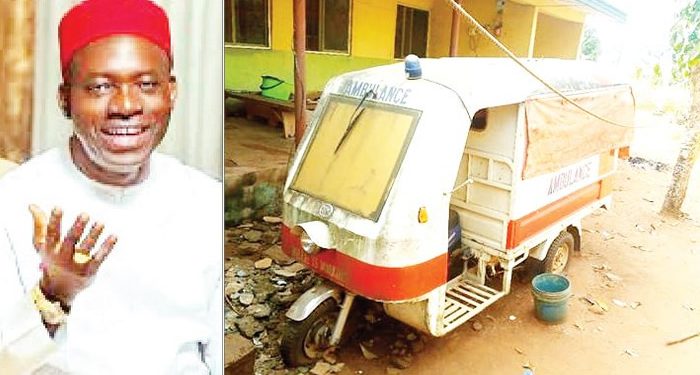Lack of water, power outage and non-functional ambulances are hampering the smooth running of primary health care centres in Anambra State.
A visit to the Primary Health Centres in communities such as Achalla in Umueze-Otutu, Ihiala Local Government Area; Okpoko in Ogbaru Local Government Area and Nkpor in Idemili North Local Government Area, show that water, electricity and personnel have remained scarce commodities in those facilities.
For instance, it was gathered that the PHCs in Achalla and Okpoko, have not had water to run those facilities for over 10 years, just as electricity has also been cut off in Achalla PHC due to gunmen activities in Ihiala Local Government Area.
Apart from lack of water and electricity, findings showed that there was no functional ambulance for mobility at these facilities, while health attendants depend on special arrangements with nearby tricycle operators for mobility of patients.
A female health attendant at the facility, who craved anonymity for obvious reasons, explained that for over 10 years, they have depended on ‘mai ruwa’ people for water supply on a daily basis and the cost is borne by the patients, in most cases.
She said, “For over 10 years, water has not run in the facility and this is hampering our activities. We have depended on ‘mai ruwa’ people for water and we spend over N20,000 on a weekly basis for water supply.
“Also, in the last seven years, the facility has not had electricity due to gunmen activities which have paralysed electricity supply in Ihiala. All these issues have become big challenges to the smooth running of the hospital and attending to the needs of patients.
“The state government is aware of the development and it is trying its best. Right now, the supply of drugs is regular, but what we need most at the moment are basically running water and electricity, these will aid our activities.”
At the Okpoko PHC, it was the same development as the health attendants at the facility also lamented lack of water, constant power outages and inadequate personnel as major impediments to their activities.
A patient, Nkem Uche, a trader, who was seen at the PHC rushing to make use of the toilet lamented that due to lack of water, the toilets remained unflushed and unkempt most of the times, adding that “if you want water that will be enough for you to flush your faeces and wash your hands well, you would have to pay more money for the water.”
Interrogated further, the patient explained that most of them don’t take their bath for days or use adequate water to wash their hands after the use of toilet due to lack of water at the facility.
Other stakeholders, residents and patients in these areas, who spoke in different interviews, described the development as worrisome and disturbing, especially in view of the cost and health implications of depending on water supply from ‘mai ruwa,’ they also lamented that it showed a lack of concern by the concerned authorities in view of the hype by the state government as to how it is “rejigging the healthcare system in the state.”
Similarly, findings at the PHCs in Awka North, Oyi, Dunukofia, Awka South, Aguata and Njikoka local government areas, showed that, although there were no issues of water and electricity scarcity, no single facility in the aforementioned local councils had their ambulances operational.
Findings also showed that almost all the keke-ambulances donated to Anambra State PHC by the immediate past administration of former Governor Willie Obiano have not been functioning, barely two years after they were procured.
Recall that the keke-ambulances were procured for the use of the state PHCs by the past administration in 2019; and as it appear today, the ambulances were seen in ruins and not being used.
The non-functional keke-ambulances became a worrisome development as it makes it impossible for patients that needed more serious attention to be moved to secondary health facilities, where adequate attention will be given to them.
Some of the health attendants at the facilities who also preferred anonymity, explained that they find it difficult to move patients because of lack of mobility vehicles.
One of the health attendants said “The purpose was to use the keke-ambulances to improve health services at the grassroots, but the project was handled by contractors, who procured non-functional ambulances for the PHCs.”
Reacting, the Executive Secretary of the state Primary Healthcare Development Agency, Chisom Uchem, said the state government is already doing a NEEDS assessment of the PHCs with a view to evaluate infrastructural needs of the facilities, adding that the state government is already attending to the issues.
The ASPHDA secretary said, “The state government has already sent officials to do the assessment of infrastructure and evaluation at the PHCs. I don’t know the particular facilities being mentioned, but the state government is already doing a NEEDS assessment at the facilities that need attention.
“Many of the PHCs had to use towing vans to take their keke-ambulances from the Government House to their facilities.”
Uchem further disclosed that arrangement have been made with local private operators of keke to provide mobility services, for which they would be paid.
She added, “So, it is not about saying that keke-ambulances were distributed to communities, but about the functionality of those vehicles. Majority of them were out of use and were never made to even service anybody from the onset.
“So, I can tell you that none of them is functional. But as a way forward, the present administration is making alternative arrangement for transportation at the PHCs, which is more reliable and sustainable.
“One of such arrangements is the introduction of the 112 emergency services, where patients are picked up when they need to be moved to the next level of care, when they call.”






